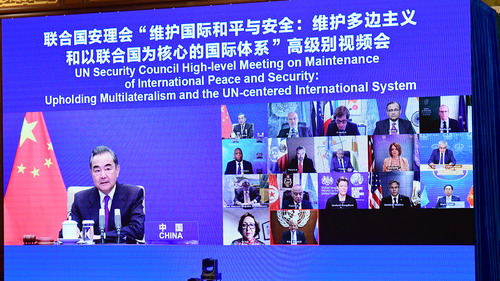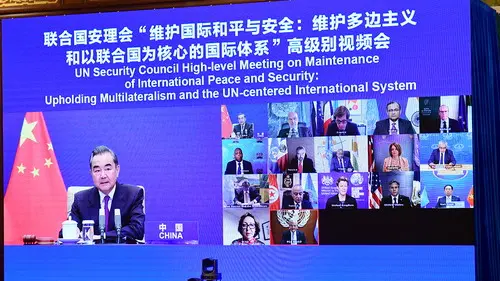
The UN Security Council's high-level meeting on "Maintenance of international peace and security: Upholding multilateralism and the United Nations-centered international system," May 7, 2021. /Xinhua
**Editor's note: **Ji Xianbai is an assistant professor and a distinguished young scholar as well as executive director of the International Political Economy Research Center at Renmin University of China in Beijing. The article reflects the author's opinions and not necessarily the views of CGTN.
The United Nations Security Council held a high-level videoconferencing briefing on "Maintenance of international peace and security: Upholding multilateralism and the UN-centered international system" on May 7. Convened by China as a signature event of its current presidency of the Security Council, the meeting could not have been timelier.
At the meeting, speakers reaffirmed their firm support for multilateralism, with, for example, Chinese State Councilor and Foreign Minister Wang Yi describing multilateralism as "not an option but a necessity" and U.S. Secretary of State Antony Blinken echoing that multilateral cooperation is not only possible but imperative.
Yet, participating countries appeared divided as to the defining characteristics of multilateral diplomacy. China emphasized the win-win prospect of multilateralism as a legitimate platform for countries, big and small, to participate in effective and equitable global governance in accordance with the common rules of the road written together by all UN members.
The U.S., however, stressed the sovereignty constraining feature of multilateralism in terms of denying countries the license to always do whatever they please. Individual countries' responsibility of exercising restraint in international affairs as a pretext of multilateralism in exchange for the efficient attainment of the "enlightened national interest" is central to the U.S. view.
Both China and the U.S. have a point. Their views can be bridged. Multilateralism, in fact, necessitates both cooperation and responsibility for global public goods.
On the one hand, the world facing us today is highly globalized and interdependent. Issues such as global warming, sustainable development, nuclear non-proliferation, mass migration, infectious diseases, systematic protectionism and terrorism are beyond any single country's ability to address them on its own.
They can only be meaningfully tackled by multilateral measures adopted through multilateral institutions like the UN. Without a doubt, cooperation, coordination and consultation undertaken in the spirit of solidarity and sovereign equality are pivotal to functioning multilateralism. Given the rising severity of the COVID-19 pandemic, multilateralism is arguably more relevant than ever.
The pandemic has brought out some of the worst instincts of humanity such as racism, xenophobia, protectionism and even anarchism and anti-intellectualism, culminating in vaccine nationalism, Asian hate, distrust of international cooperation and global division of labor.
But down the road, it will take successful global cooperation on COVID-19 responses as a positive example of multilateralism to convince skeptical and insecure citizens that going it alone is not the way forward, whether during or in the aftermath of the pandemic.
At the same time, practicing multilateralism means countries will have to behave responsibly. Communicating and clarifying one's foreign policy intentions, coping with the negative extraterritorial effects of seemingly national policy decisions, settling disputes amicably on a rules-based basis, unleashing the potential of inter-connected and synergised cross-border economic development, and consciously promoting inter-cultural, inter-faith and inter-linguistic understandings among peoples through multilateral and cooperative means are among ways in which countries can advance global public goods together to the benefit of all.

A China-Europe freight train bound for Madrid, Spain, and carrying two containers of medical supplies and other goods, departs the city of Yiwu, east China's Zhejiang Province, March 21, 2020. /Xinhua
Clearly, upholding multilateralism based on cooperation and responsibility will do much good to international peace, security and prosperity. But in recent years, multilateralism has been proclaimed dead a few times for several reasons.
Countries scrambled to put their national interest first in the name of honoring democratic will and safeguarding policy autonomy. Some countries prefer exclusive "small clique" multilateralism involving only so-called "like-minded partners" as opposed to genuine broad-based multilateralism, splitting the world along ideological and geopolitical lines.
Multilateral institutions established gradually after World War II by Western powers are seen as only serving the interest of the rich and powerful, leading to widespread resentment towards multilateralism as it is practiced. Governance reforms at the International Monetary Fund and World Bank dominated by the U.S. and Europe have been slow and a vast majority of emerging and developing countries are gravely underrepresented as a result.
The Doha Development Agenda of the World Trade Organization had lapsed in the shadow of the North-South divide on key trade issues. The Group of Twenty is also losing much of its initial luster as countries increasingly resort to unilateral measures to achieve national socio-economic policy goals.
However, it should be known that the stakes are simply too high for multilateralism to falter. It is time for the world to seek unity around multilateralism. The UN meeting called by China could well be an important step toward revitalizing much-needed multilateralism.
(If you want to contribute and have specific expertise, please contact us at [email protected].)
 简体中文
简体中文



